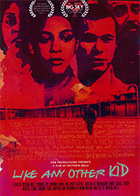
Like Any Other Kid 2017
Distributed by Tugg, Inc., 855-321-8844
VSM Productions
Directed by Victoria Mills
DVD,
College - General Adult
Adolescents, Correctional Institutions, Education, Prisons, Social Work
Date Entered: 12/10/2018
Reviewed by Alan Witt, Business Librarian, SUNY GeneseoLike Any Other Kid takes direct aim at the heart, establishing empathy towards imprisoned youths and proposing reform to the prison systems where they are incarcerated. Said reform is the Missouri Approach, a program that adopts a therapeutic model and aims at behavior modification and support rather than warehousing and containment. This documentary thus has an implicit political message, but confines itself to revealing the program and the kids within it rather than making a direct appeal.
To that end, this film consist almost entirely of interviews, recorded group therapy sessions, disciplinary sessions, and group meetings in the “pods” of imprisoned juveniles. It follows three separate iterations of the program in different states, lingering on specific prisoners and staffers in order to keep a sense of narrative but not confining itself completely to individuals. It follows these individuals through a year or two, showing their progress and failures in equal measure.
Like Any Other Kid has a degree of intellectual honesty that is refreshing. The filmmakers picked a set of stories to highlight, ranging from successful reintroduction to society to graduation into the adult prison system. The cheerleading aspect is communicated in the initial segment of the film with images overlaid with the statistics from the Missouri approach: a 92% reduction in recidivism. Secure in its statistical fortress, the film is able to honestly portray failure without detracting from the central message that there is an intrinsic value to treating kids with love and respect. This honest portrayal makes the film difficult to watch at times; not only is it intensely personal with segments of raw emotion, but those segments include teenagers being sent to adult prison, dealing with separation from loved ones, and talking about gang violence and deaths in their families. The film aims to show the full humanity of the kids in question, both their successes and failures as well as how their story led them to that point, and it is successful in that goal.
Like Any Other Kid has decent potential for classroom use. While the 90 minute runtime makes it difficult for use at the undergraduate level, professors willing to sacrifice a class could start a larger discussion or major project surrounding the issues of juvenile incarceration. For less time-intensive uses, specific clips or sections can be shown to highlight different therapeutic approaches, examine discipline strategies, or talk about larger societal issues around punishment and incarceration. Likewise, the personal stories and segments can be clipped and highlighted for anger management training and psychology classes in general. While the full impact of the film requires a full viewing, there is enough material available for a variety of classroom uses, and thus this film is recommended for purchase.